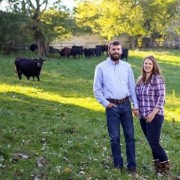Grassfed: Why these “ka-razy” local farmers made the switch
Grassfed: Why these “ka-razy” local farmers made the switch
– By Kristin Henderson, chief veggie conversationalist:
When Brooks and Jil Davis decided to switch from conventional farming and go grassfed and sustainable, they were pretty much alone. Many of their fellow farmers didn’t like the idea. The couple’s decision cost them one friendship and affected their farm networking. They were labeled, “Ka-razy!”
So why make the switch? Research. Like everything else with their farm, Jil and Brooks did the research and went where the facts led them.
In our last post, we explored organic vs sustainable vs local, and explained why the best way to ensure your food is nutritious and eco-friendly is to know the farmer. So in this post we’d like you to get to know one of our newest farmer partners.
Starting out
Jil and Brooks built ThorneBrook Farms from the ground up. They’re first generation farmers. They didn’t inherit their farm. Jil grew up on a small hobby farm with horses, goats, and chickens that, along with the dogs, were pets, not food. Brooks didn’t grow up on a farm at all.
Still, he had the farming bug. He studied agricultural business at Virginia Tech, while Jil studied accounting and business at a local college. In 2006, they got married and started planning their cattle, sheep, and chicken farm.
“We researched, researched, researched,” Jil recalls. They bought some land near Goochland, Va., prepared it, saved money, and got their financial ducks in a row for the initial herd purchase. They bought their first herd in 2007.
At the time, they were conventional farmers and called themselves “grass-based”. That means they raised their cattle on pasture but still used medicines, vaccines, conventional feeds, and hay grown with fertilizers and sprays. “We were far from organic and definitely not sustainable,” according to Jil.
They were also working really long hours and running a landscaping business on the side. They wanted to do more than just break even financially. They needed their farm to be self-sufficient and were eager to find ways to streamline their operation and reduce their costs.
Their research turned up a sustainable farming practice called intensive and rotational grazing where the animals are moved from pasture to pasture. They were intrigued by both the business end of things and the science that showed how this model supported the health of the land and animals, while also improving the meat quality. Studies show that a truly grassfed process results in more nutritional and tasty meat.
They’d done their research and they had their answer. Sustainable farming practices, including rotational grazing, were the way to go.
Making the switch
In 2009, they shifted their business model 180 degrees: They switched from conventional practices to a sustainable, natural approach. Grass-based herd management not only fit their lifestyle and goals, it had the potential to maximize their profits — the natural grassfed movement was gaining momentum and they were ready to meet the demand.
Today, their sustainable practices extend throughout their farm operation. They even rely on solar power for the water and electric fencing in their pastures. Watch how well it works!
At first, after they went sustainable, they continued to sell through wholesalers and middlemen. But it wasn’t long before they saw that selling direct to local consumers was a great opportunity. Their sustainable practices were making their farm more financially sustainable, too.
Jil and Brooks sacrificed the comfortable old conventional way of doing things. But by going sustainable, Jil explains, “Our business increased and our foundation grew stronger. We also grew as a couple and business partners. I can say that we are 100% at peace with our model and the quality it produces.”
Here at Seasonal Roots, we love supporting local, sustainable farmers like Jil and Brooks of ThorneBrook Farms! Our members are helping ensure they have an economically viable way to feed us all delicious, nutritious food. We’re excited to make their grassfed lamb sausage the first item we offer to our members. There’s more to come from this farming couple whom we’re getting to know so well!
ABOUT SEASONAL ROOTS
Since 2011, Seasonal Roots’ online farmers market has connected Virginia families with local family farmers who use sustainable, humane practices. Our veggie fairies – mostly moms who believe in living better through scrumptious, healthy eating, being kind to animals, protecting the environment, and spreading joy – home-deliver freshly harvested produce, eggs, grassfed dairy and meat, plus artisan fare. We empower our members to eat better and live better with more nutritious, flavorful food that’s good for us and good for the planet. More info at seasonalroots.com.
